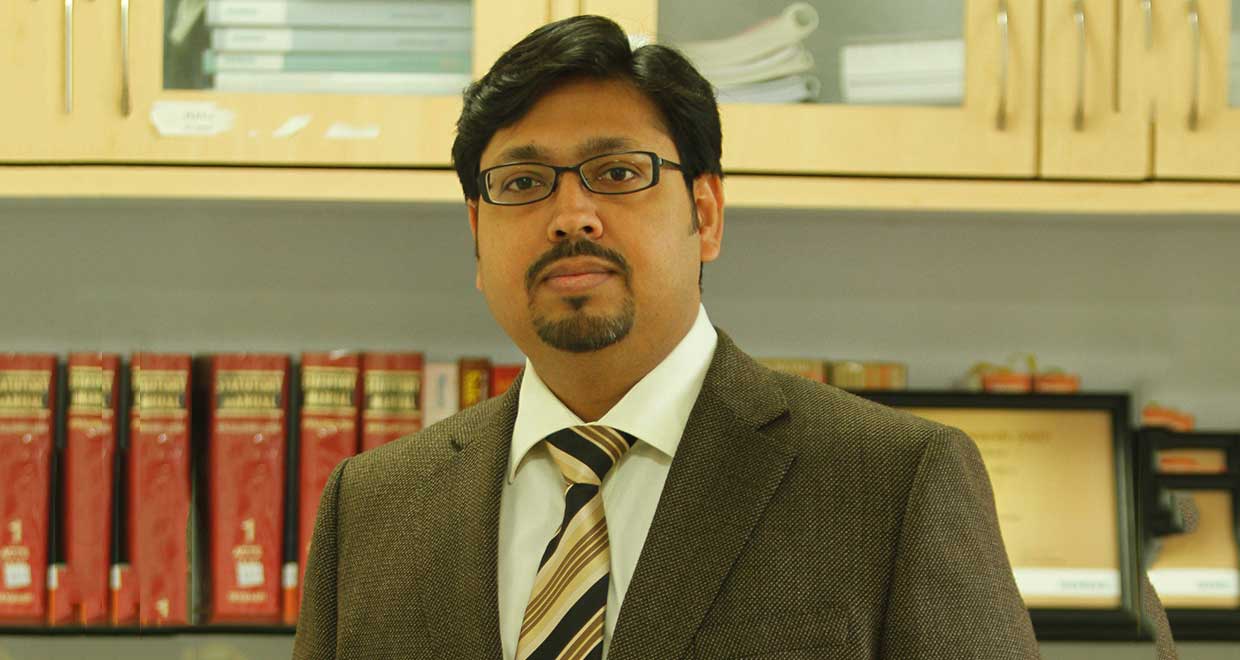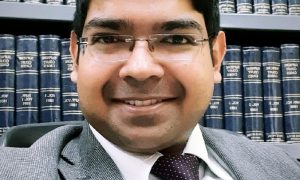Saugata Chakravarty graduated from South Calcutta Law College, Calcutta University in 2001. Thereafter he went to pursue Masters from Cardiff University. He started his career as an Associate at Gagrats and co. where he worked for two years. He joined Siemens in 2007 as a Legal Manager and in February, 2013, he was promoted to the rank of General Counsel. He is currently working there as a General Counsel of South Asia cluster.
In this interview, he talks about:
- Law school experience at Calcutta and Cardiff University
- Work experience at Gagrats
- Induction at Siemens
- Journey from Legal Manager to General Counsel
Given that most of our readers are law students and young lawyers, how will you introduce yourself to them? What motivated you to choose law as a career?
Firstly, since you mention that most of your readers are law students and young lawyers I would like to say to them I do not have many grey hairs myself – at least that’s how I like to feel! I am currently General Counsel of Siemens Ltd, South Asia cluster, but how I got here is quite interesting.
Secondly, when I was considering which career to pursue while studying at the Kendriya Vidyalaya at Bilaspur the two professions which really fascinated and attracted me was medicine and law, since I felt I could really touch people’s lives in either field – and make a difference. I finally opted for medicine and even took the medical entrance test, but didn’t get in. But that did not discourage me as I had my Plan B ready– and turned to Law.
Tell us something about your college life? What all activities did you participate in?
I studied Law at the South Calcutta Law College. It was a five-year course. However, the teaching hours were not so usual – 6:30am to 10:30am. So you had the rest of the day free! I utilised this time to go to the local courts – esp. the High Court. Besides the courts, I also was an active participant in various college events and also inter-college cultural events. Moot courts and college fests were important events where I spent lot of time networking.
How important do you think that extra-curricular activities are to a law student?
Extra-curricular activities are important for all students, not just law students! As I mentioned earlier I participated in many moots. I was also active in college affairs – and even became elected as General Secretary for two years. This position gave me my first experience in interface with management – since I as general secretary was representing the student body to the management of the college. This gave me my first exposure to working in a team and dealing with many diverse ideas and viewpoints.
Do you believe that excellent CGPA is absolutely necessary for success?
No, not at all. How you make the most of your scores is important. So many very successful people hardly had what could be termed excellent grades either in school or college – not only in law but other professions as well. So determination, drive and a go-getter attitude are very often the propellants for success. I would consider that a good CGPA is necessary – but not sufficient condition for success.
When and how did you decide to pursue Masters? Was it a professional requirement or an endeavour out of academic interests?
India was liberalising, the economy was being opened to foreign investment. In the emerging scenario I felt it was imperative to gain an in-depth understanding of global commerce and finance and when the opportunity presented itself I immediately opted to do a Masters in Commercial Law. While a Masters is not a professional requirement a person with a Masters would definitely have an edge over others, all other things being equal.
You have done your LL.M. from Cardiff University. Can you please share your experience at Cardiff?
It was a wonderful experience! The method of teaching was also quite different. Firstly, our course was taught by practising lawyers – which made a huge difference if you wanted to practice law. That was not so in India. The taught modules made you learn the subject as if you were going to apply that knowledge. So a thorough understanding of the content of the courses was very important.
Looking back, how significant do you think that your legal education was? When did you happen to experience the learning curve?
The learning curve continues – more so in a field like law. Legal education in India needs more practical emphasis.
Many years ago, the Bar Council of India had come up with an apprentice system under a lawyer with more than a decade and half in the profession – 16 years to be exact. This unfortunately never saw the light of day, due to legal challenge mounted from various quarters and was ultimately struck down by the Supreme Court on some technical grounds.
A couple of years ago, an All India Bar Exam was introduced for all lawyers passing out from various law schools – who had to take this exam in order to practice. I think this an excellent step in the right direction.
Please tell us about your experience with regard to your first two years of work as an Associate at Gagrats & Co.
When I joined Gagrats as an associate, it was the first time I was working in a big law firm. The two years I spend there was a very rapid learning experience in a very wide variety of commercial and corporate law. I closely worked with the partner – Jehangir and Rustom Gagrat. At that time the firm was undergoing a split – in fact had already undergone a split – and when I joined there was a fair amount of uncertainty (and excitement!). I took that challenge to continue and prove my worth.
After two years of work at Gagrats, you joined Siemens as a Legal Manager. What led to this shift?
Siemens got in touch with me as there was an opening available. I readily accepted their job invitation and joined as a manager. The reason for this shift was that I wanted to experience working in-house in a large transnational corporation and I was quite curious to know what happens to the opinions you give in law firms – how are they dealt with by the recipient of the advice. So in a sense I was crossing over to the other side and seeing it from their perspective.
You currently work as a General Counsel – South Asia Cluster there. What qualities do you think helped you to achieve this status?
Well, I guess ability to lead and get along with and pull together people from diverse backgrounds while at the same time interacting with management, and I guess my passion for my work! The main qualities I think would be helping advance the business goals of Siemens and in protecting the Company’s reputation for integrity and leading and developing a fairly large team when I was lead lawyer of a couple of business divisions.
Many lawyers would say that the actual learning takes place in the years of practice. How far would you say it is true?
There is a lot of truth in that. At the same time, you could start gaining the actual learning while still at law school if you spend your vacations and spare time in the courts or in the chambers of experienced lawyers or at law firms.
What is a workday like for you?
No day is like the previous day! And in large multi-national company’s legal department work never follows a settled pattern – despite various conscious attempts to standardise the work of in-house counsel. Challenges occur each day. And unlike a law firm your duty does not stop at the point of only giving advice – but also ensuring that it is followed!
What kind of legal work is there?
We get work encompassing diverse branches of law – which is different from our core areas of advising on projects and infrastructure. Despite that, very little work is outsourced to external firms – other than actual litigation in the courts. We have quite a sophisticated system of selecting external firms.
Would you say that there exists a difference in the working environment of a law firm and legal department of a company?
Yes, and as already mentioned, giving advice is one part, discussing the same and implementing it with all stake holders is altogether a different kettle of fish!
Would you say the opportunity a firm provides for a young lawyer is worth the trade off in building a reputation?
All depends on a particular individual. People with entrepreneurial flair generally tend to strike out on their own. I find I enjoy working with challenges – both in workload and timelines. Building a reputation to gain success requires good, solid hard work and years of dedication – and many a times a stroke of luck. I don’t see any trade off – at least in the initial formative years. Since working in a firm or on your own – you are still on the lower rungs of the career ladder and what reputation you will garner will of course depend on how the initial years go.
What are the primary essentials of a corporate lawyer? How do you say a fresh graduate can work on building these skills?
Good domain expertise – knowing the law, solid analytical abilities, ability to communicate well and of course hard work! A fresh graduate could look for a mentor….who could either proactively guide the young lawyer or the fresh graduate closely observes how the senior goes about with her/his work – and extract and internalise from observing. The latter is usually the case in learning the ropes since seniors rarely have the time to do individual mentoring, as they might be overseeing many other young employees or fresh recruits.
How do you manage to strike a balance between your personal and professional life?
The balance is still being perfected! Once I have struck that balance, I will let you know.
How important would you say are business development skills at such higher roles?
For law firms it is getting to be quite important. GCs are not only trusted business advisors but also business enablers. So we not only partner with Business, standing shoulder-to-shoulder, but are also business enablers – ensuring the business goals of the Company are reached by ensuring effective legal risk management utilising all the opportunities presented by law.
What is your opinion on generalisation v. specialisation?
There are good arguments for both. Of course if you specialise then you should take your specialist skills to a place where some use is made of it. Otherwise don’t bother – you can carry on fine being a generalist. You might be interested in knowing, I have set up a platform in Siemens legal department whereby people with expertise in a particular area of law can collaborate with others who can gain invaluably from such expertise and experience – expertise which they may not be aware was existing in the Legal department since most of us sit at diverse locations and do not meet very often in person. The name of this grouping is SMEG – Subject Matter Expert Group – and this is the first place to look for support in a specialised area of law.
Is there anything you would like to have done differently?
I feel I have done things differently and loved every moment of it….maybe in hindsight I could have done my Masters after I had gained a couple of years experience as a lawyer.
Does Siemens Group take interns? What is the process for same?
Yes we do. Your readers could contact our HR for the same. The job description for every opening is quite detailed – being good at your work is obviously a given. And then of course the usual other “must haves” like “soft skills”, etc. I also wish to let you know that once a person is recruited in Siemens legal department, the Company provides a myriad of opportunities for further career development. We have learning colloquiums, centres of excellence, leadership development centres, advanced management centres all aimed at grooming employees so that they realise their full potential.
What would be your message to our readers who are budding lawyers and law students?
Hard work focused sensibly and utilising all opportunities that come your way, no matter how slight, will always get you results and help you achieve your dreams! So please go for it!


























